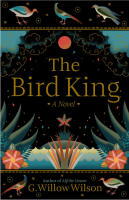Review: The Bird King, G. Willow Wilson
Mar. 16th, 2019 03:51 pm
Brief Synopsis: we begin with Fatima, a slave and concubine in the court of Grenada in late 1491 or early 1492. Both sheltered and trapped in the harem, she is coming to realise that the Emirate of Granada is about to fall. So far, so historical-realist. Then there’s her friend Hassan, with whom she meets in secret, who has the power to draw magically accurate maps. Plot happens, and the two opt to go on the run, fleeing the powers of Catholic Spain through a narrative which traces a looping path between straight up historical fiction, alt-history-with-magic, and straight up portal fantasy. It’s going on my list of ‘books to read when you’re bitter about Narnia’, which may or may not be a list you also keep. If it is, this should be on it. There’s a lot that’s great about this book! I found it a little slow to get into, although I enjoyed the early scene-setting chapters; once the plot began rolling for real I was hooked. Fatima is a fascinating, complex character: she begins as a ‘relatable’, rebellious-against-her-lot young woman, and as the plot unfolds the traits which marked her out early on as a Rebellious Strong Female Character become problematised, prove to be strengths in some circumstances and weaknesses in others, and are ultimately given nuance and sympathy. Likewise Hassan, bookish, sheltered and a little effete, develops complexity as he goes, including showing strengths which Fatima does not have. I loved, sincerely and wholeheartedly, the relationship between the two of them - a deep, possessive, passionate friendship which has the potential to overshadow romantic-sexual relationships but is not in itself one of those. That, too, is problematised, toyed with, shown to be both a strength and weakness, as the novel progresses.
Wilson’s grasp of the religious-cultural environment of 15th century Spain is, to my eye (and bearing in mind I’m not a hispanicist or an islamicist in speciality, although it is my period), pretty damn good. The range of characters and the range of belief types which she gives flesh to here is notable - the figures of the Inquisition are chilling, but not monolithic, and balanced by the brilliant heartwarming character of Gwennec, a Breton monk who has become caught up in events bigger than his background. Luz, a lay sister acting on behalf of the Inquisition, is the villain of the piece and very well characterised. Fatima is not herself particularly devout, but Hassan is, and the differences between their experience of religion and belief is nicely woven into the complexities of their relationship.
My one major qualm, historically speaking, is with the intersection between Hassan’s sexuality and religion - he keeps speaking of men ‘like me’, in a way that maps onto a contemporary idea of homosexuality as a discrete identity, but to the best of my understanding isn’t a good match for late medieval Islamic society. For a start, I would have expected a /lot/ more emphasis on active-passive role (unless that is in fact what is meant by ‘like me’, that Hassan’s attraction to men, which he has not grown out of, has put him in a peculiar gender category - in which case it’s massively underexplored). While medieval Islam did condemn sodomy, an awful lot of medieval Islamic philosophy, medical writing, and cultural media did not, and I wasn’t satisfied with glancing references to the palace community turning a blind eye for the sake of Hassan’s dignity. But, as I said, my expertise isn’t Islamic Spain, and particularly not 15th century Islamic Spain - I /know/ this wouldn’t be right for the twelfth or even thirteenth century, but perhaps something changed.
My bigger issue is that despite all that is good about this book, I’m just not super happy with the way it manages the genre-blending tightrope. I can’t even put my finger on why, but I don’t come away going ‘WOW what a masterful combination’, I come away going ‘er, was that alt-history or portal fantasy? Huh?’. Granted, I have this problem with several books widely recognised as Very Good - most recently Ishiguro’s The Buried Giant - so perhaps that’s a personal taste thing. I have some minor pacing issues with the very final part of the book (a key aspect of the Fatima-Hassan relationship was not given enough time to expand after a final revelation), but my main problem is just… not quite being in board with the book’s genre choices. I also suspect it may have started life as YA and been uncoupled for some reason (although it’s not like modern YA has a problem with attempted rape scenes, soo…), and I wonder if I would have liked it better had it sat more firmly as a YA novel. (This is essentially the reverse of the problem I have with Leigh Bardugo, which I didn't realise when I first drafted this review. Huh.)
In conclusion: if you want something different, something less christian-europe / northern-european-pagan focused, in your medieval alt-history fantasy, this may be relevant to your interests, but I don't think it's the pinnacle of what could be achieved in that vein. I am verz pleased to have received an ARC via NetGalley in exchange for this honest review.